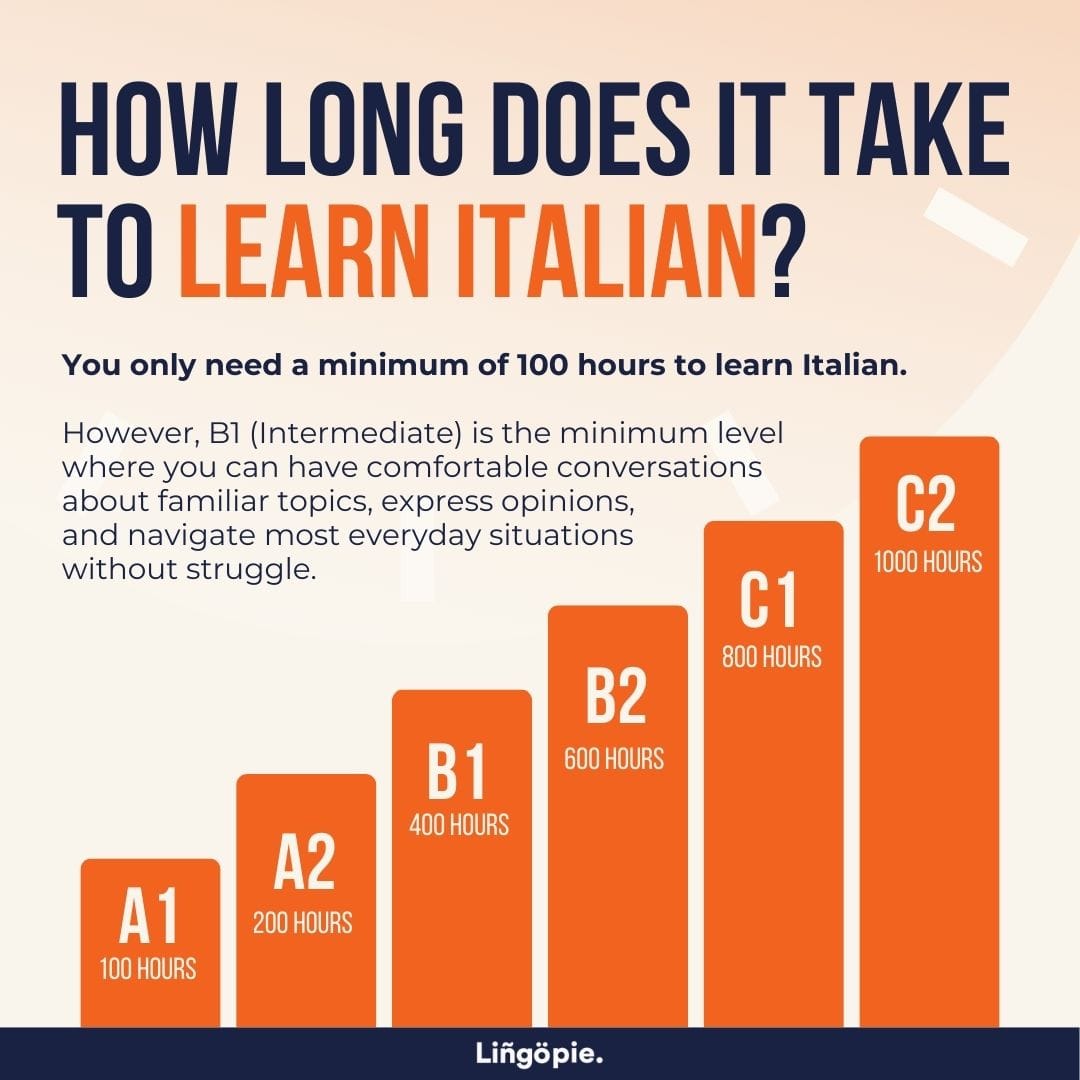Do you dream of effortlessly conversing with locals as you stroll through Italy’s charming, cobblestone streets? As someone determined to learn Italian independently, making real progress can feel frustratingly out of reach.
You've likely wasted countless hours on tedious textbooks and apps that promise "easy language mastery," only to leave you feeling stuck and unfulfilled. These rigid approaches neglect the very reason you're drawn to Italian - to immerse yourself in the vibrant culture and embrace la dolce vita.
But what if there was a more engaging, effective way to absorb Italian at your own pace? A method that forgoes the dull grammar lectures and instead lets you "live" in the language through real-world experiences?
In this article, we're unveiling the ultimate strategy for mastering Italian on your own terms. We'll share techniques that truly resonate, transforming your language journey from a chore into an exhilarating adventure.
- 12 Italian Hand Gestures And Their Exact Meanings
- 20+ Easy Italian Short Stories To Learn The Language
- How To Learn Italian With News In Easy Italian

Is Italian Hard To Learn?
The short answer is no. In fact, the Foreign Service Institute (FSI) ranks Italian as one of the easiest languages for native English speakers to learn. They estimate that you can achieve basic fluency in just 24 weeks, or 600 hours of study. So if you go to Italy for an intensive course or dedicate at least 9 hours a day, you'll reach basic fluency and hold conversations within 6 months.
Moreover, if you already speak another Romance language, such as Spanish, French, or Portuguese, you’ll find that learning Italian is even easier. The vocabulary, grammar, and sentence structure similarities among these languages can give you a significant head start in your Italian learning journey.
Here are the main components of the language broken down by difficulty:
- Grammar: Italian grammar can be challenging due to the numerous verb conjugations, tenses, grammatical genders, and irregularities.
- Pronunciation: Italian is a phonetic language, meaning each letter is pronounced consistently. The only potential challenge is learning to roll your R's, but this is not essential for communication.
- Vocabulary: Many Italian words are similar to their English counterparts, making vocabulary acquisition relatively straightforward and enabling learners to start conversing sooner than expected.
So, while mastering any new language requires effort and dedication, you can rest assured that Italian is a highly accessible and achievable goal for English speakers.

How Long Does It Take To Learn Italian?
The time it takes to reach fluency in Italian can vary greatly depending on factors such as your learning style, prior language experience, and the amount of time and effort you can dedicate to studying.
Some language experts recommend studying for at least 20 hours a week to learn the basics in a short amount of time. Naturally, not everyone will have 20 hours a week to dedicate to learning a new language — life is busy, after all! But even with just an hour or less a day and the right techniques, you can become conversational pretty quickly.
Can I Learn Italian In 3 months?
While building a solid foundation in the language within three months is possible, setting realistic expectations is important. With dedication and the right learning strategies, you can master the basics of Italian grammar, vocabulary, and pronunciation in three months, allowing you to engage in simple conversations and navigate common situations.
Can I Learn Italian In 1 year?
If you make learning Italian a consistent part of your daily routine, you can achieve a significant level of proficiency within a year. By immersing yourself in the language through daily practice, engaging with native materials, and seeking out opportunities to use Italian in real-life situations, you can develop a strong command of the language and communicate effectively with native speakers.

Best Ways To Learn Italian
Many learners turn to several traditional methods when learning Italian. While these approaches can be effective, they often require a significant investment of time and money.
Classroom Instruction
One of the most common ways to learn Italian is through classroom instruction, either at a university, community college, or language school. These courses are typically led by experienced teachers and follow a structured curriculum. However, they often require a substantial time commitment, with classes meeting several times a week for several months or even years. Additionally, the cost of tuition, textbooks, and other course materials can add up quickly.
Private Tutoring
Another popular option is to hire a private Italian tutor. This approach allows for personalized attention and a customized learning plan tailored to your specific needs and goals. However, private tutoring can be one of the most expensive ways to learn Italian, with hourly rates ranging from $20 to $100 or more, depending on the tutor’s experience and location.
Here are some examples of private Italian tutors with their hourly rates:
- TutorMe: Offers one-on-one Italian lessons with experienced tutors, with prices starting at $10 per hour.
- Verbling: Provides private Italian lessons with native speaker tutors, with prices starting at $15 per hour.
- Preply: Offers private Italian tutoring with experienced tutors, with prices starting at $15 per hour.
- iTalki: Connects learners with private Italian tutors, with prices starting at $10 per hour.
- Wyzant: Offers private Italian tutoring with experienced tutors, with prices starting at $30 per hour.
- Varsity Tutors: Provides private Italian tutoring with experienced tutors, with prices starting at $40 per hour.
Language Learning Apps
There are numerous language learning software programs available that offer interactive lessons and exercises to help you learn Italian and other foreign languages. While these programs can be convenient and allow you to learn at your own pace, they can also be quite pricey, with some costing hundreds of dollars.
- Duolingo: A free language learning app that offers a comprehensive Italian course with interactive lessons, quizzes, and games to help you learn at your own pace.
- Memrise: A language learning app that uses spaced repetition and gamification to help you learn Italian vocabulary and phrases, with a large community of users who share courses and resources.
- Lingopie: Offers language-learning features and thousands of hours of compelling and original TV shows, movies, music videos in various languages.
Immersion Programs
As mentioned earlier, Italian immersion programs, such as studying abroad in Italy, can be highly effective for learning the language quickly. However, these programs often come with a hefty price tag, including tuition, housing, travel expenses, and other costs associated with living in a foreign country.
Here are examples of Italian immersion programs along with their price ranges:
- Il Sasso, Montepulciano
- Scuola Palazzo Malvisi, Bagno di Romagna
- Piccola Università Italiana, Tropea
How To Learn Italian By Myself?
While traditional methods can certainly be effective for learning Italian, they may not be the most practical or affordable options for everyone. Fortunately, alternative approaches allow you to learn Italian on your own, at your own pace, and without breaking the bank. Read on below as we explore how you can use other strategies to start speaking Italian like a local.
Watch Italian TV And Movies
The most engaging, effective, and affordable way to learn Italian independently is to consume native content. Watching Italian TV shows and movies is a fantastic method for improving your language skills because it gives you real language exposure.
Studies based on Stephen Krashen’s Input Hypothesis suggest that language acquisition occurs when learners are exposed to comprehensible input, i.e., language that is slightly above their current proficiency level but still understandable. Watching Italian TV shows and movies can provide this type of input, helping learners improve their language skills through exposure to natural language use.
Italian TV and movies provide authentic exposure to the language as it's spoken by native speakers. You’ll hear many accents, dialects, and colloquialisms that you might not encounter in textbooks or language courses. This exposure helps you develop a more natural understanding of Italian pronunciation, intonation, and rhythm.
Play Italian Learning Games
Playing Italian language learning games is another excellent way to learn the language independently. These games, which can be found on various websites, apps, and even in board game form, provide an interactive and engaging way to practice Italian vocabulary, grammar, and pronunciation.
By turning language learning into a fun and competitive activity, Italian learning games help you stay motivated and make the learning process more enjoyable. They also offer instant feedback, allowing you to learn from your mistakes and reinforce your knowledge.
Moreover, many of these games are designed to target specific language skills, such as verb conjugation or sentence structure, enabling you to focus on areas where you need the most practice.
Read And Write
By reading Italian texts, such as short stories, newspapers, or online articles, you expose yourself to a wide range of vocabulary, sentence structures, and grammatical concepts in context. This helps you develop a more intuitive understanding of the language and improves your comprehension skills.
On the other hand, writing in Italian is also recommended for better practice of Italian. The act of writing in Italian helps you internalize new vocabulary, practice correct grammar and sentence structure, and express your thoughts and ideas in the language.
Make Flashcards
Flashcards allow you to break down the language into manageable chunks, focusing on specific words, phrases, or grammatical structures. You can create your own deck based on what concepts are most relevant to you. If you're using digital flashcards, there are also pre-made flashcards or Anki decks that you can use for learning Italian.
Use Italian Language Learning Apps
Using Italian language learning apps is a convenient and effective way to learn the language on your own. These language apps, such as Lingopie, Duolingo, Babbel, and Rosetta Stone, offer various interactive lessons, exercises, and games that help you build your Italian vocabulary, grammar, and pronunciation skills.
One of the biggest advantages of using Italian language learning apps is their flexibility. You can access them anytime, anywhere, from your smartphone or tablet, making it easy to fit language learning into your busy schedule. Whether you have a few minutes during your lunch break or a longer stretch of time during your commute, you can easily open the app and start learning.

Why Learn Italian: Reasons To Learn Italian
One of the best reasons to learn Italian is to connect with people. Today, it's estimated that more than 63 million people speak this language! Therefore, knowing a little bit of Italian can open up a whole new world of social and cultural opportunities for you in different parts of the world.
If traveling, working, or living in Italy is on your bucket list, then learning Italian is a must. Italy’s culture is incredibly rich and full of nuances that you will appreciate even more when you can speak the language. Plus, you’ll be able to order the best things on the menu at Italian restaurants!
Other reasons to learn Italian, or any new language for that matter, are that it stimulates your brain, forces you to look at yourself and the world differently, and improves your memory. Really, there aren’t any reasons not to learn Italian!
Related: Best Italian Cooking Shows to Learn Italian
What Is The Best Way To Learn Italian?
Watching Italian movies and TV shows is the most effective and enjoyable way to learn Italian. This immersive approach offers a wealth of benefits, including the ability to master the language at your own pace while exploring the rich culture and history of Italy.
While there are numerous methods for learning Italian, one of the most effective and enjoyable ways is watching Italian movies and TV shows. This immersive approach offers several key benefits:
- You'll hear Italian as native speakers, including various accents, dialects, and colloquialisms.
- You’ll understand how Italian words fit in context
- Italian media provides valuable insights into Italian culture, customs, and social norms
- You can watch whenever and wherever you want, making it easy to integrate language learning into your daily routine.
- Many Italian films and TV series are available on affordable streaming platforms or even for free.
- Learning Italian through movies and TV shows is inherently enjoyable, motivating and making the learning process more effective.
One platform that combines all these benefits is Lingopie, a streaming service designed specifically for language learners. With Lingopie, you can watch a wide variety of Italian movies and TV shows with interactive subtitles, allowing you to look up words and phrases as you watch. The platform also offers quizzes and review drills to reinforce your learning, making it a comprehensive tool for mastering Italian through engaging content.
Why Lean Italian With Lingopie
Research is increasingly showing that people who watch shows and movies in another language, in addition to using other study methods, have better comprehension, pronunciation, vocabulary, and grammar than those who don’t. This is where Lingopie comes in!
Lingopie is a unique language learning platform that combines the power of authentic Italian media with advanced learning tools, making it an ideal choice for anyone looking to master the language independently. Here's why learning Italian with Lingopie is so effective:
- Offers a vast selection of engaging Italian content, catering to various interests and proficiency levels.
- Interactive subtitles allow you to easily look up and save unfamiliar words and phrases while watching.
- Adaptive learning tools, such as quizzes and flashcards, reinforce your understanding and adjust to your progress.
- Lingopie provides a personalized learning experience, allowing you to set goals, track progress, and receive recommendations.
- The platform is accessible from any device, making it convenient to fit language learning into your busy schedule.
- Learning Italian through authentic movies and TV shows on Lingopie offers an immersive and entertaining way to master the language.
So, why not learn Italian like you learned English growing up? Lingopie has thousands of hours of great international television, including plenty of intriguing Italian shows and films.
The platform is designed for learners of all levels, so it doesn’t matter whether you're at a beginner or advanced level of Italian. Every show comes with subtitles in Italian and English, so you can switch back and forth as you want.
Not only that, but you can click on any word or phrase as you’re watching to get an instant translation. When you’re done watching, you can review what you just learned with built-in word lists and flashcards — convenient, right?
Join thousands of language learners using Lingopie to learn new languages by watching TV today!
Signing up for a free trial is totally risk-free, and you can cancel at any time. But we’re pretty sure Lingopie is one of the best Italian language learning programs out there!
FAQ
What is the 80/20 rule in language learning Italian?
The 80/20 rule applied to Italian suggests that learning the 1,000-2,000 most common words will give you about 80% of everyday conversational ability. Focus first on essential grammar patterns (present tense, basic past tenses, common prepositions) and high-frequency phrases for everyday situations like ordering food and asking directions. This strategic approach allows you to become conversationally functional much faster than trying to master every vocabulary word or grammatical nuance.
Can I learn Italian in 3 months?
You can achieve a practical, conversational level of Italian (A2 or low B1) in three months with intensive daily study of 2-3 hours combining structured learning, immersive listening, and regular speaking practice. This foundation will help you handle basic conversations and navigate everyday situations, though developing true fluency requires significantly more time. Remember that language learning is a continuous journey—three months provides a solid foundation, but proficiency develops over years of practice and exposure.
How can I learn Italian by myself?
Learn Italian independently by immersing yourself in authentic content (podcasts, YouTube, music), practicing with language exchange partners, and establishing a consistent daily study routine of at least 20-30 minutes. Focus on high-frequency vocabulary first and don't fear making mistakes as they're essential to the learning process. Combine reading progressively challenging materials with regular speaking practice for the most effective results.
Is it hard to learn Italian?
Italian is one of the easier languages for English speakers to learn because both share Latin roots and many cognates (similar words). The Foreign Service Institute estimates it takes about 600-750 hours of study to reach general proficiency, significantly less than Russian, Arabic, or Chinese. While you'll need to master concepts like gendered nouns, verb conjugations, and the rolled 'r' sound, these challenges are manageable with consistent practice.





![Russian Alphabet: Everything You Need to Know [2026]](/blog/content/images/size/w1200/2025/04/Russian-alphabet-.jpg)
![17 Best Italian Series and Movies On Netflix [For Beginners]](/blog/content/images/size/w300/2026/02/Italian-TV-Shows.jpg)
![How To Say I Love You In Italian Like A Native Speaker [Guide]](/blog/content/images/size/w300/2025/01/I-Love-You-In-Italian.jpg)
![8 Best Apps To Learn Italian As A Beginner [RANKED]](/blog/content/images/size/w300/2026/01/Best-Apps-To-Learn-Italian.jpg)
![6 Best Italian Translator Apps For Learners [TESTED]](/blog/content/images/size/w300/2026/01/Best-Italian-Translation-Apps.jpg)